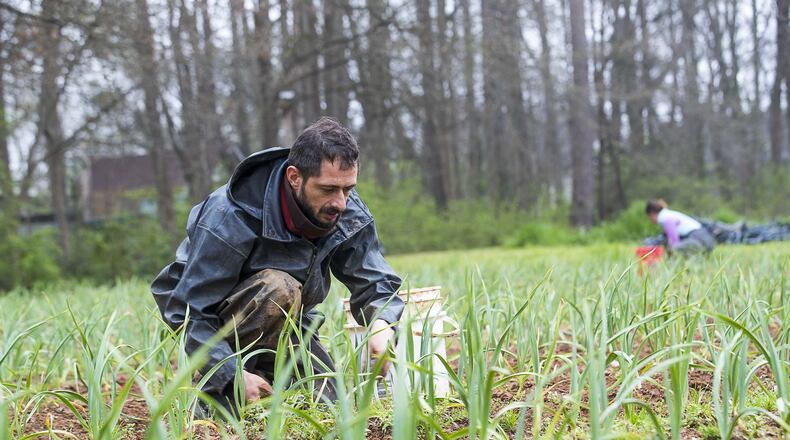Across metro Atlanta, an early marker of spring is the opening of neighborhood farmers markets, their tables full of tender salad greens, eggs and fresh bread.
But as the COVID-19 pandemic worsens, small local farmers who sell at those markets are racing to find ways to stay afloat if those markets do not open in the coming weeks. For the handful of popular farmers markets that operate year-round or that opened in early March as the coronavirus crisis intensified, the ever-changing federal recommendations and local ordinances regulating the size of public gatherings has complicated matters. And farmers who depend on sales not only at those markets, but also to restaurants, say their financial peril is compounded since many high-end dining rooms are scaling back service to take-out only or closing their businesses indefinitely.
Atlanta Mayor Keisha Lance Bottoms designated farmers markets as “essential services” in the city-wide, 14-day, stay-at-home order she issued on March 23. It was welcome news to farmers market managers and farmers.
Yet, as uncertainty continued to rise this week, more than a half dozen local food advocacy groups rallied to raise money for those farmers. Even as that program gets off the ground, some farmers are trying to convert to a direct, home-delivery or community-supported agriculture (CSA) model to stay viable. The markets say they should be considered grocery stores, providing an essential resource — fresh fruits and vegetables — during an unprecedented calamity.
“This is a much bigger picture than, ‘Are we going to cancel our garden workshop on Saturday?’” said Judith Winfrey, co-owner of Love is Love Farm at Gaia Gardens in Decatur. “On a doomsday level, could all of these farms go out of business?”
“Stay Open”
Julia Asherman, owner of Rag & Frass Farm, was as prepared as she could be last Sunday at the Grant Park Farmers Market outside Eventide Brewing. She had tables laden with salad greens, napa cabbage, parsley, eggs and bouquets of anemones. Vegetables selling for between $3 and $5 per unit, flowers for $10 per bunch. But the Middle Georgia farmer had strict safety protocols for customers. They weren’t allowed to touch the produce or smell it. They had to point to what they wanted. Asherman, wearing latex gloves, bagged their selections. Another worker, also wearing gloves, took payments. Cash wasn’t allowed.
“There’s a ton of conversation right now about how do we do this and not put people at risk,” Asherman said.
Nearby, shoppers bought kale and collards from Jamila Norman, owner of Patchwork City Farms in Oakland City. They used hand sanitizer. She bagged food. Within two hours she was sold out.
“They did a run on the market like they did on the grocery store,” Norman said. “They were dropping $40, $50 a pop at almost every table.”
It was the antithesis of the farmers’ market experience for some; jostling shoulder to shoulder for the perfect head of cabbage, sipping coffee and eating free samples. Distancing had swiftly become the rule. The market had hand sanitizing stations. More safety measures will be added, said Katie Hayes, executive director of Communty Farmers Markets. Her organization runs 10 markets, including Grant Park, Decatur, Oakhurst, Ponce City Market, East Atlanta Village and five Fresh MARTA markets. Besides Grant Park, which is year-round, the Decatur market was open last weekend, Hayes said. She vowed they will remain so, but the ground continues to shift, seemingly hour by hour.
While Georgia's governor hasn't issued a shelter-in-place order as California's has, the Centers for Disease Control and Prevention has discouraged gatherings of 10 or more people. California's order allows residents to leave home for "food, prescriptions and healthcare," which includes grocery shopping.
“If grocery stores are allowed to stay open, so should farmers markets,” Hayes said.
Some popular intown markets such as Freedom Farmers Market at the Carter Center and Morningside Farmers Market are staying open. In a post on its website, Freedom Farmers Market declared, “Yes we are open and have no plans to close the market!” The market is “not a public gathering, it is a grocery store,” it went on to say.
Peachtree Road Farmers Market in Buckhead has decided to remain closed until at least April 4. The Green Market at Piedmont Park has delayed its opening, as well.
The dilemma of whether to open or close isn’t unique to the roughly 60 markets in Fulton, Dekalb, Cobb, Clayton and Gwinnett counties. The National Farmers Market Coalition is working with markets from California to Key West to share best operating practices during the crisis and for virus-related regulatory news by state.
In Georgia, however, neighborhood and small farmers markets aren’t regulated by the state. The Department of Agriculture only has jurisdiction over four large markets in Forest Park, Savannah, Augusta and Cordele, said Julie McPeake, department spokesperson. McPeake said they’ll stay open.
Local markets operate under loose agreements with landowners and managers of markets, said Will Sellers, executive director of Wholesome Wave Georgia and a co-author of Atlanta’s urban agriculture ordinance.
“The biggest risk factor is if a private landlord says, ‘We’re shutting down completely,’” Sellers said.”Where does that market go?”
“On Demand”
Anticipating more disruption, farmers are concerned not just about places to sell their crops, but how much to plant.
“We’ve had farmers contact us asking us if we’re going to do the market this summer,” said Mandy McManus, market manager of the Lilburn Farmers Market. “And they are telling me they need to know now because they have to get seedlings started.”
Willie Miller, owner of Miller City Farms in the city of South Fulton, was going to open the first farmers market there in mid-May. That is now on hold. But enrollments in his CSA program have exploded since the outbreak took hold in Georgia. By this time each year, a handful of families are enrolled. Last week “in the course of three days, we got 50 enrollments and that never happens,” Miller said. “Every time there’s a new update on corona, we get a surge of people enrolling.”
For Asherman, the Grant Park market represents about 65% of her farm’s income. A majority of the rest comes from three Middle Georgia farmers markets and restaurants. Especially with restaurant closures, she needs those markets to remain open.
“We put stuff in the ground two to three months before we make money on it,” Asherman said. “Between April and July is when we make a huge percent of our income on the high-dollar fruit and crops. What we do or don’t do now will affect what we make the rest of the year.”
Similarly, Winfrey of Love is Love farm is depending on her farm’s annual plant sale in April. It’s 20% of their annual revenue, she said. In years past it has been an event, with people coming in for seedlings of tomatoes and summer squash and socializing. Now Winfrey and her husband, Joe Reynolds, will have to come up with new safety measures which means people won’t be able to enter the greenhouse or perhaps the farm itself.
“We’re going to ask people to preorder and schedule pick up times,” Winfrey said.
Restaurant sales were a good part of their business but that has fallen off since many dining rooms have shuttered or gone to take out only. For now Winfrey and Reynolds are depending on their CSA.
Norman, of Patchwork City Farms, doesn’t have a CSA but is partnering with Truly Living Well Center for Natural Urban Agriculture near the Atlanta University Center to start an online, direct-delivery and pick-up service.
“It’ll be a prepaid basket, you stay in your car, here’s your food, almost like a drive through,” Norman said. “An on-demand CSA.”
In the meantime, Georgia Organics, The Common Market, Food Well Alliance, Global Growers, Wholesome Wave, Community Farmers Markets and the Atlanta Farmers Coalition started the COVID-19 Emergency Relief for Farmers Fund, to raise money for small local farms.
Farmers such as Asherman hope their businesses will survive to see another growing season.
“These are farms that have taken years to buy equipment, pay off land,” she said. “I don’t want to believe that the hardship that would take us out is the one for which we could be a solution.”
About the Author
Keep Reading
The Latest
Featured







